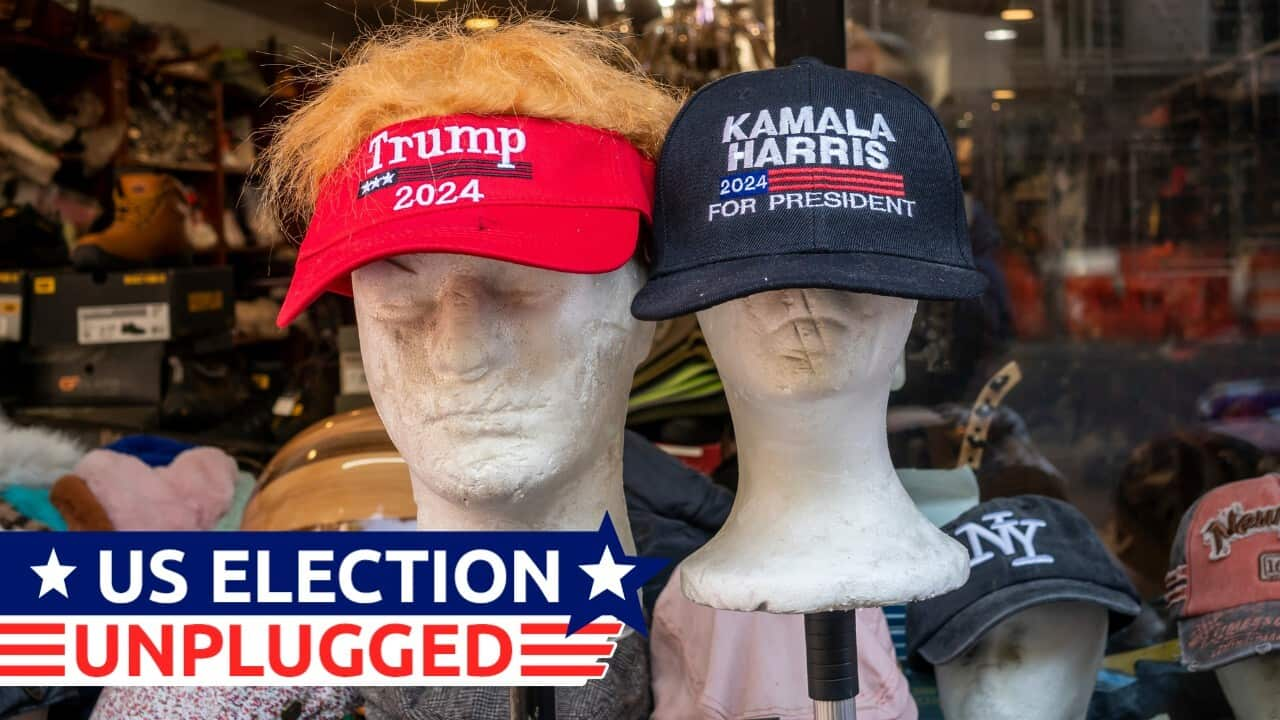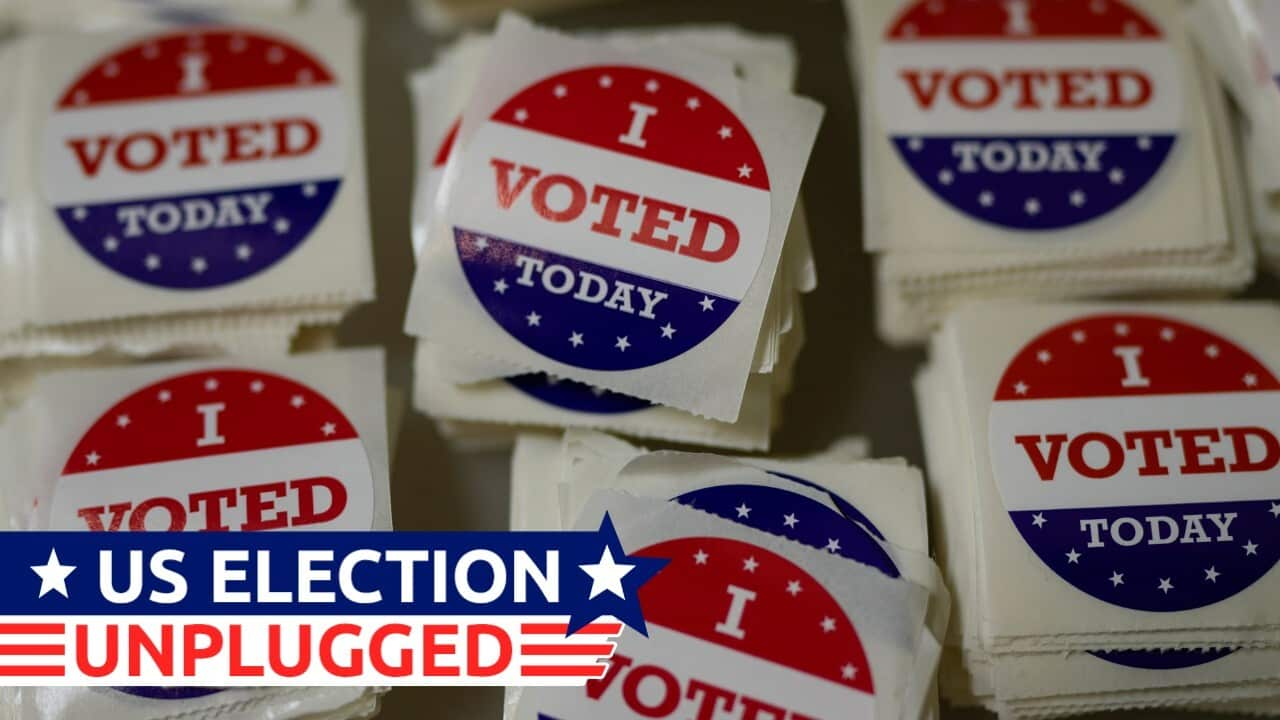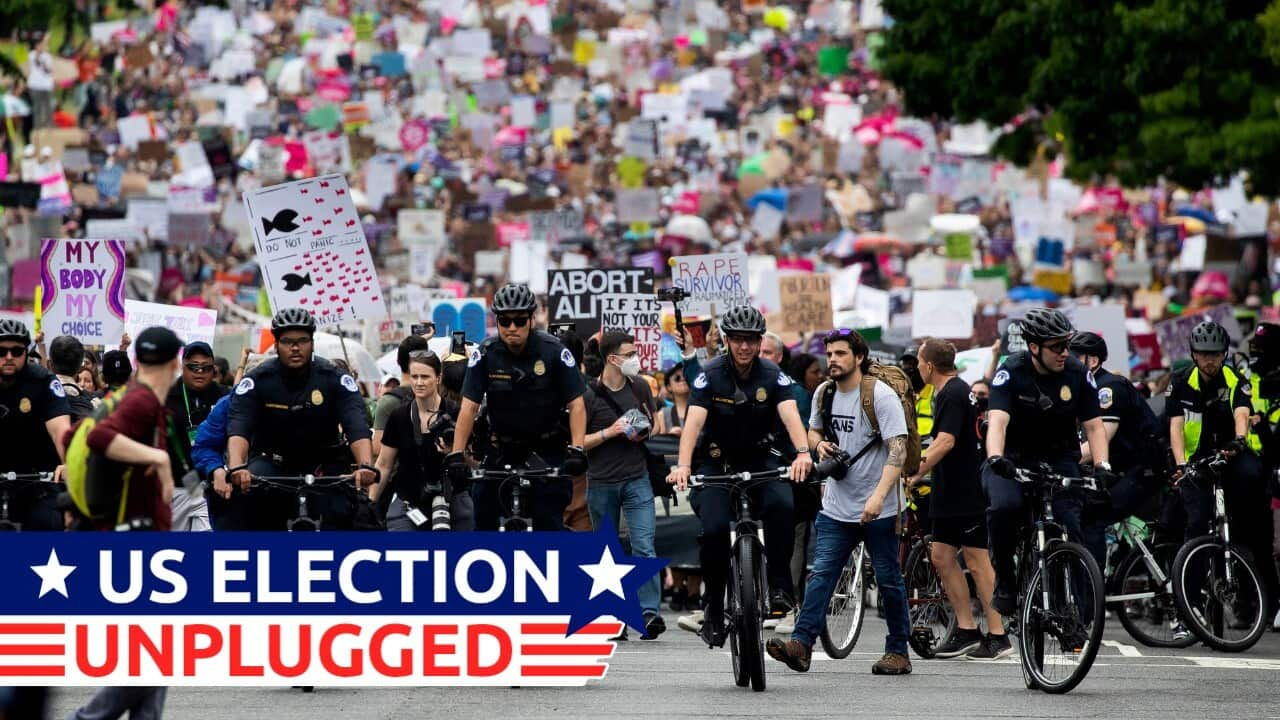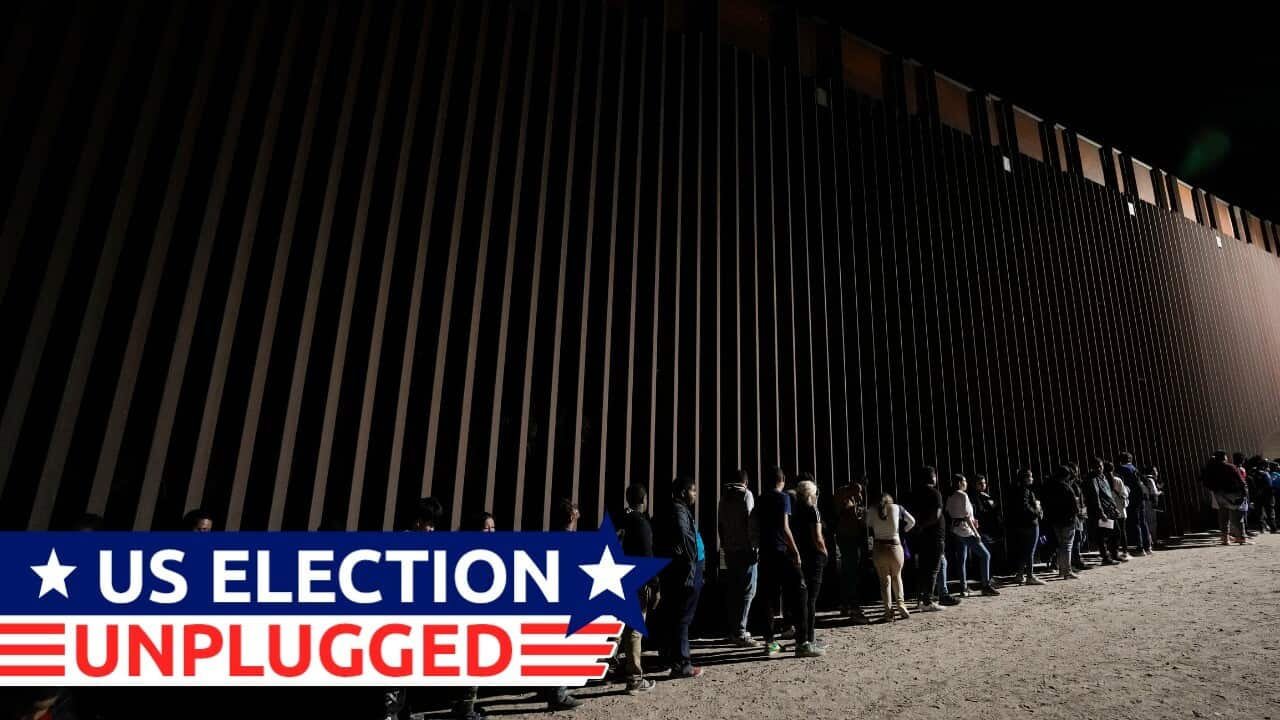TRANSCRIPT
You've seen him here.
NEWS REPORT: "Donald Trump returned to Butler Farm Show in Butler, Pennsylvania today, the site of an assassination attempt in July.”
You've seen her there.
NEWS REPORT: "To Kamala Harris who is speaking right now in Michigan, with Liz Cheney.”
You've seen them both everywhere.
ANNOUNCER: "Join me in welcoming the next president of the United States..."
Well - Donald Trump and Kamala Harris are not quite everywhere.
The candidates have concentrated their visits to seven states - identified as Michigan, Arizona, Nevada, Pennsylvania, North Carolina, Georgia, and Wisconsin.
These are what's known as battleground states, where the result could conceivably go either way, for either party.
TRUMP: "Last night I gave a speech in Las Vegas. 29,000 people."
HARRIS: "And it's great to be back in Madison.”
The candidates might be kept busy with their appearances and interviews - but the Democrats and Republicans alike also have an army of paid staff and volunteers backing them up.
Some of them are well known figures, like former president Bill Clinton, who has stumped for Harris in Georgia.
“I told somebody I was tired of hearing politicians criticise Donald Trump for all his lies. I wish they’d criticise him for all his 'I’s'. Only I can do this. The sun rose this morning, I made it happen. It rained yesterday. If I’d been president it never would have happened. Right? I’m about 'I’d' to death.”
There's plenty of ordinary people too.
Lee Graham is among a group of engineering union volunteers walking neighbourhoods in Michigan, also in support of Harris.
“So today we're here in Southgate, an area where I used to live - that I was blessed to be able to live in. Today we're walking the neighbourhoods in this community here to be able to share with them. So we're going door to door from our Union Local 324 to the union members that live in this community. And we're able to walk up to the door and hopefully have them answer the door and be able to have a good dialogue with them and understanding if they've already voted, if they plan on voting, on how they plan on voting.”
But of all the battlegrounds, one has seen both candidates invest more money, energy and visits than anywhere else in the country.
“We win Pennsylvania, we win this great Commonwealth, we are going to win the whole ball game. It's such an important place.”
Berwood Yost is a poll director at Franklin & Marshall College.
He says Pennsylvania is seen as a good indicator of which way the presidential race might go.
“Pennsylvania is a state that went for Trump in 2016, went for Biden in 2020. It's got a lot of white, working class voters. It's got large urban centres, rural communities. So Pennsylvania serves as sort of a microcosm of the country as a whole, I think, in many ways.”
Joe Morris is the chair of political science at Mercyhurst University.
He says no Democrat has won the presidency without Pennsylvania since 1948 - and within the state itself, there's a laser focus on Erie County.
“Erie County is a county that holds a really special place in Pennsylvania politics. It has voted for the winner in nearly every statewide election since 2008. So in some senses it's a bellwether county. It is hard to imagine a path to victory for Democrats that doesn't come through the state of Pennsylvania.”
Campaigner Marie Troyer confirms the Democratic party have opened three offices in Erie County.
“As soon as President Biden decided he wasn't going to run, and we found out that it was Kamala Harris - it just woke the beast. As we want to say, in Erie, people are so excited. They are coming out of the walls to help.”
It's not clear what resources the Republican party have established in the county.
But this voter, Melissa Labritz, says they should not be counted out.
“Come here, I see a lot of Democrats. I'm here to spread the word that Republican is the way to go.”
The polls indicate that neither candidate has a clear lead, and voters - like Brian Neel from Chester County - are feeling the tension.
“I think it's split pretty even-even right now. Half of my friends are, you know, voting for Kamala, and the other half are voting for Trump. So if that's any indication, then I think it's a pretty tight race here.”
In addition to the battleground states, much of the campaigning has also been gelling around key constituencies, which both parties need the support of in order to win the White House - and control of Congress.
For Donald Trump, his base of supporters has traditionally consisted of men, and so-called evangelical voters.
It's part of the reason why he recorded a three-hour interview on a podcast hosted by Joe Rogan, a social media figure with millions of followers, mostly men.
"Joe Rogan podcast. The Joe Rogan experience."
The interview made Trump three hours late to a campaign rally in Michigan.
“So I apologise. But you know, it's all about winning. We got to win. And we did some things today that will help us win. I think we did a lot of taping. A lot of this, a lot of that, a lot of everything.”
But it's the so-called evangelical voters, who were key to putting Trump in the White House in 2016, that has come in for even more sustained attention -
"And God bless the USA.”
- with Trump casting the election as a spiritual battle for the soul of the nation.
“For four straight years I fought for Christians like no president has ever fought before. You know that.”
“I would like to think that God saved me for a purpose, and that's to make our country greater than ever before.”
The Trump campaign has focused heavily on particular issues that traditionally appeal to Republicans and these evangelical voters, including abortion and immigration.
“We will end inflation, we will stop the invasion of criminals coming into our country, and we will bring back the American dream. We're going to bring it back.”
Tump's campaign approach has already been a winning strategy for some voters, like Marian Betances from the Pennsylvania town of Bethlehem, who went Republican in her early vote.
“I voted for him because of the Christian values. I believe that America has lost its values.”
But Kamala Harris is aiming for a different crowd.
Cory Alpert is a former campaign aide from the United States who served for three years in the Biden administration, working primarily for the First Lady and Second Gentleman.
He says the switch between Joe Biden and Kamala Harris mid-race naturally impacted on the kind of campaign she has subsequently run.
“You're figuring out who your candidate naturally appeals to. So you know, Joe Biden has a different appeal than Kamala Harris does. He has much greater affinity and history especially with the white working class, whereas Kamala Harris has greater appeal with women; black women and women of colour more generally.”
Harris has made reproductive rights a central feature of her campaign in her appeal to these women voters.
“I do believe it is critically important to acknowledge that this is not just a political debate. This is not just some theoretical concept. Real harm has occurred in our country. A real suffering has occurred. People have died. And it is important to highlight this issue because this is among the most critical issues that the American people will address when they vote for who will be the next president of the United States.”
Chandler James from the University of Oregon says Harris has also announced a range of policies designed to appeal to black voters.
But he says Trump has also reached out to that base.
“Now what the Trump campaign has said at times before is 'What do you have to lose? Democrats have been in power for these years, and these inequities persist, so why not go with me?'“
Social justice activist Tamika Mallory has been canvassing in Georgia, hoping to convince black men and women to still support Harris, amid reports of increasing defections to the Republican camp.
“Community is key. And community would mean that we came today, we encouraged them to vote. We hope that they will. Some people have said that they already have and or that they’re planning to go to the polls.”
Elsewhere, there are concerns turnout will be low.
Sabrina Friday is the founder of Mother's Nest, an organisation in Macon that provides baby supplies, training, food and housing to mothers in need.
There's more than 47,000 people in Bibb County, about 80 miles south of Atlanta, who are eligible to vote but don't - which is four times the number of votes that President Joe Biden carried the state by in 2020.
She says most of those voters are black and poor, and not even the prospect of Kamala Harris' historic candidacy is likely to get them to the polls.
“I myself tell them the importance of getting out and vote. And by the show of hands and participation - they don't want to do it because they feel left out. They feel like nobody cares.”
Donald Trump has also been keen to appeal to Latino voters who traditionally have supported the Democrats.
The campaign has been in damage control since a New York rally where Puerto Rico was described as "a floating island of garbage" - but Trump says his support hasn't dropped as a result.
“I'm so proud that we're getting support from Latinos like never before... Nobody loves our Latino community and our Puerto Rican community more than I do.”
In the same vein, just as Trump has gone after black and Latino voters, Harris has targeted Republicans - and they've been coming willingly.
Megan King lives in Wisconsin, and recently appeared in an ad for the Democrats highlighting her concerns around the state's abortion laws.
“As someone who has almost always voted conservative, I'm having a really hard time wanting to vote for anyone in the Republican Party moving forward.”
Harris has been joined more than a hundred former Republican officeholders and officials on the campaign trail, including former Congresswoman Liz Cheney, now reviled within her party for refusing to back Trump.
Ms Cheney's message is country over party.
“I would just remind people if you're at all concerned you can vote your conscience and not ever have to say a word to anybody. And there will be millions of Republicans who will do that on November 5.”
The disquiet within Republican ranks is also why Harris made one of her closing campaign statements in Washington, in the same place where Trump inspired his followers to riot in the Capitol on January 6, 2021.
“I know many others are still considering who to vote for or whether you'll vote at all. So tonight I will speak to everyone about the choice and the stakes in this election.”
Still, it's unclear that these targeted efforts will swing the election the way that the candidates want it to go.
There are commentators and voters who say the campaign's decision to concentrate on battleground states means other areas will start to feel neglected - and vote accordingly.
Elveda Martinez is the Walker River Paiute Tribe Voting Rights Leader in Nevada.
“The big disappointment this year in these races is that these campaigns - nobody's been here. Nobody's been to rural Nevada. Not one of them.”
Others have openly questioned campaign tactics.
Former Democratic House Speaker Nancy Pelosi says people still want to hear about the policies that could change their lives.
“There's a school of thought that says, you've got to be more aggressive in telling people how, what is at risk in this. And then there's the other school of thought that says, I'm tired of hearing about him, I know how bad it is, what are you going to do? So they have to do a combination of that.”
Neither campaign is taking any chances.
In addition to their grassroots operations and the relentless appearances of the presidential candidates in swing states, the campaigns are both are pumping hundreds of millions of dollars into advertising across the nation, targeting undecided voters and their key demographics.
TRUMP CAMPAIGN AD: "Folks, it's time for another resurrection of Christian clout at the ballot box. We tell Christians to get out and vote."
HARRIS CAMPAIGN AD: "In this election, we each face a question: what kind of country do we want to live in?''
But traditional media has not been their only weapon.
Social media has also played a role in helping to shape voter attitudes and engagement.
La Trobe University political communication professor Andrea Carson has previously told SBS that social media has fragmented campaign messages.
“One of the things that makes this role more complicated is that not everyone is getting the same information all of the time because it has fragmented across the different digital and analogue media spheres. And so people are getting their information - some of it is high quality and some of it is low quality, depending what aspects - whereabouts they are getting their information from.”
The Professor also says the campaigns are either helped or hindered by the existence of what she calls pink slime units which generate and spread misinformation.
Cory Alpert says artificial intelligence can complicate this landscape.
“As people go online - go on Facebook or X or Instagram - what we're seeing is not being decided by a human... It's being decided by an algorithm that, at least in the instance of the larger social media companies, is opaque.”
Mr Alpert says that generally speaking, AI generated content on social media platforms aren't taking sides.
“It's not that the meta algorithm is trying to give you right wing or left wing content, but it's trying to show you extreme content. Because the algorithm is primed to deliver content to you that you are going to spend more time on the platform engaging, whether that's liking it, sharing it, commenting on it... So when you have information that's not true, the algorithm doesn't know that. It just knows that it's getting people to engage with it.”
But he says social media is playing a role in calcifying extreme partisan positions.
Georgetown Professor of Government Dr Nadia Brown says polls and studies have highlighted this growing trend.
“Our population gets its news from vastly different sources. We don't agree on what the facts are. There is a demonisation of political elites and people that hold different policy preferences than you. The use of violence as an acceptable form of political engagement is very, very scary. And so, the health of our democracy is on the line.”
Mr Alpert believes more research is needed to understand just how AI and social media are shaping the voter perceptions and attitudes that campaigns then build themselves around.
“It's that people are going into their ideological bubble and they're never leaving... Obviously there's a difference between having views on the other side of the political spectrum and then having extreme views - and I think we need to do more to understand that difference. But people are polarising, and they're moving further in either directions, and they're entrenching in those directions.”
It's anybody's guess which way the US will decide on November 5 in such a highly charged, partisan atmosphere.
And millions of votes have already been cast in early voting, one of them Covington resident Sandra Macalusa in Louisiana.
“Well, instead of waiting until the day of voting, it's just a lot easier to come early and get it over with.”
Donald Trump says the early voting results are looking good for Republicans.
“We're doing great in Nevada, we're doing great in Arizona, we're doing great - really good in North Carolina. How about that? People of North Carolina. They showed up to vote in record numbers, and the place was practically demolished by Hurricane Helene.”
But whether or not that's true won't be known til election night, when the final results are tallied.
Berwood Yost says with such a close race, it might come down to which candidate has been better organised at the grassroots level, in a country where voting is not compulsory.
“Both candidates' current voters are equally motivated. This is going to come down to which campaign is, I think, better on the ground. That's ultimately going to be what tips the scales here.”













